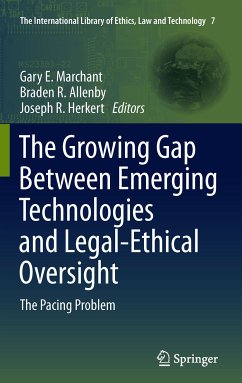
Codes of Ethics and Ethical Guidelines (eBook, PDF)
Emerging Technologies, Changing Fields
Redaktion: Laas, Kelly; Hildt, Elisabeth; Davis, Michael
Versandkostenfrei!
Sofort per Download lieferbar
96,95 €
inkl. MwSt.
Weitere Ausgaben:

PAYBACK Punkte
48 °P sammeln!
This book investigates how ethics generally precedes legal regulation, and looks at how changes in codes of ethics represent an unparalleled window into the research, innovation, and emerging technologies they seek to regulate. It provides case studies from the fields of engineering, science, medicine and social science showing how professional codes of ethics often predate regulation and help shape the ethical use of emerging technologies and professional practice. Changes in professional ethics are the crystallization of ongoing conversation in scientific and professional fields about how ju...
This book investigates how ethics generally precedes legal regulation, and looks at how changes in codes of ethics represent an unparalleled window into the research, innovation, and emerging technologies they seek to regulate. It provides case studies from the fields of engineering, science, medicine and social science showing how professional codes of ethics often predate regulation and help shape the ethical use of emerging technologies and professional practice. Changes in professional ethics are the crystallization of ongoing conversation in scientific and professional fields about how justice, privacy, safety and human rights should be realized in practice where the law is currently silent. This book is a significant addition to this area of practical and professional ethics and is of particular interest to practitioners, scholars, and students interested in the areas of practical and applied ethics.
Dieser Download kann aus rechtlichen Gründen nur mit Rechnungsadresse in A, B, BG, CY, CZ, D, DK, EW, E, FIN, F, GR, HR, H, IRL, I, LT, L, LR, M, NL, PL, P, R, S, SLO, SK ausgeliefert werden.












